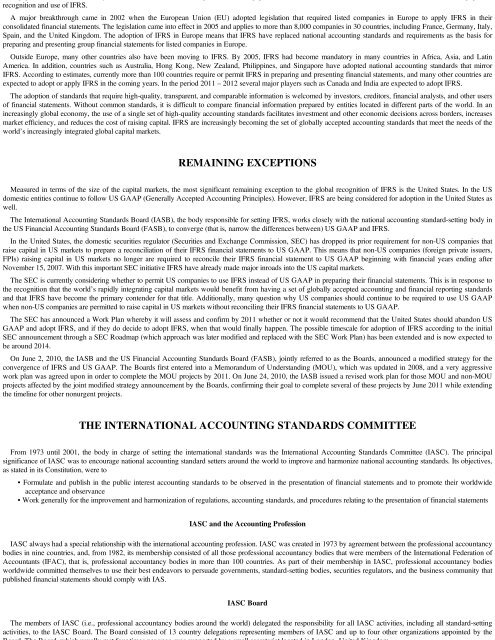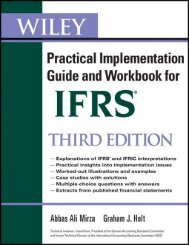Your document headline
You also want an ePaper? Increase the reach of your titles
YUMPU automatically turns print PDFs into web optimized ePapers that Google loves.
ecognition and use of IFRS.<br />
A major breakthrough came in 2002 when the European Union (EU) adopted legislation that required listed companies in Europe to apply IFRS in their<br />
consolidated financial statements. The legislation came into effect in 2005 and applies to more than 8,000 companies in 30 countries, including France, Germany, Italy,<br />
Spain, and the United Kingdom. The adoption of IFRS in Europe means that IFRS have replaced national accounting standards and requirements as the basis for<br />
preparing and presenting group financial statements for listed companies in Europe.<br />
Outside Europe, many other countries also have been moving to IFRS. By 2005, IFRS had become mandatory in many countries in Africa, Asia, and Latin<br />
America. In addition, countries such as Australia, Hong Kong, New Zealand, Philippines, and Singapore have adopted national accounting standards that mirror<br />
IFRS. According to estimates, currently more than 100 countries require or permit IFRS in preparing and presenting financial statements, and many other countries are<br />
expected to adopt or apply IFRS in the coming years. In the period 2011 – 2012 several major players such as Canada and India are expected to adopt IFRS.<br />
The adoption of standards that require high-quality, transparent, and comparable information is welcomed by investors, creditors, financial analysts, and other users<br />
of financial statements. Without common standards, it is difficult to compare financial information prepared by entities located in different parts of the world. In an<br />
increasingly global economy, the use of a single set of high-quality accounting standards facilitates investment and other economic decisions across borders, increases<br />
market efficiency, and reduces the cost of raising capital. IFRS are increasingly becoming the set of globally accepted accounting standards that meet the needs of the<br />
world’s increasingly integrated global capital markets.<br />
REMAINING EXCEPTIONS<br />
Measured in terms of the size of the capital markets, the most significant remaining exception to the global recognition of IFRS is the United States. In the US<br />
domestic entities continue to follow US GAAP (Generally Accepted Accounting Principles). However, IFRS are being considered for adoption in the United States as<br />
well.<br />
The International Accounting Standards Board (IASB), the body responsible for setting IFRS, works closely with the national accounting standard-setting body in<br />
the US Financial Accounting Standards Board (FASB), to converge (that is, narrow the differences between) US GAAP and IFRS.<br />
In the United States, the domestic securities regulator (Securities and Exchange Commission, SEC) has dropped its prior requirement for non-US companies that<br />
raise capital in US markets to prepare a reconciliation of their IFRS financial statements to US GAAP. This means that non-US companies (foreign private issuers,<br />
FPIs) raising capital in US markets no longer are required to reconcile their IFRS financial statement to US GAAP beginning with financial years ending after<br />
November 15, 2007. With this important SEC initiative IFRS have already made major inroads into the US capital markets.<br />
The SEC is currently considering whether to permit US companies to use IFRS instead of US GAAP in preparing their financial statements. This is in response to<br />
the recognition that the world’s rapidly integrating capital markets would benefit from having a set of globally accepted accounting and financial reporting standards<br />
and that IFRS have become the primary contender for that title. Additionally, many question why US companies should continue to be required to use US GAAP<br />
when non-US companies are permitted to raise capital in US markets without reconciling their IFRS financial statements to US GAAP.<br />
The SEC has announced a Work Plan whereby it will assess and confirm by 2011 whether or not it would recommend that the United States should abandon US<br />
GAAP and adopt IFRS, and if they do decide to adopt IFRS, when that would finally happen. The possible timescale for adoption of IFRS according to the initial<br />
SEC announcement through a SEC Roadmap (which approach was later modified and replaced with the SEC Work Plan) has been extended and is now expected to<br />
be around 2014.<br />
On June 2, 2010, the IASB and the US Financial Accounting Standards Board (FASB), jointly referred to as the Boards, announced a modified strategy for the<br />
convergence of IFRS and US GAAP. The Boards first entered into a Memorandum of Understanding (MOU), which was updated in 2008, and a very aggressive<br />
work plan was agreed upon in order to complete the MOU projects by 2011. On June 24, 2010, the IASB issued a revised work plan for those MOU and non-MOU<br />
projects affected by the joint modified strategy announcement by the Boards, confirming their goal to complete several of these projects by June 2011 while extending<br />
the timeline for other nonurgent projects.<br />
THE INTERNATIONAL ACCOUNTING STANDARDS COMMITTEE<br />
From 1973 until 2001, the body in charge of setting the international standards was the International Accounting Standards Committee (IASC). The principal<br />
significance of IASC was to encourage national accounting standard setters around the world to improve and harmonize national accounting standards. Its objectives,<br />
as stated in its Constitution, were to<br />
• Formulate and publish in the public interest accounting standards to be observed in the presentation of financial statements and to promote their worldwide<br />
acceptance and observance<br />
• Work generally for the improvement and harmonization of regulations, accounting standards, and procedures relating to the presentation of financial statements<br />
IASC and the Accounting Profession<br />
IASC always had a special relationship with the international accounting profession. IASC was created in 1973 by agreement between the professional accountancy<br />
bodies in nine countries, and, from 1982, its membership consisted of all those professional accountancy bodies that were members of the International Federation of<br />
Accountants (IFAC), that is, professional accountancy bodies in more than 100 countries. As part of their membership in IASC, professional accountancy bodies<br />
worldwide committed themselves to use their best endeavors to persuade governments, standard-setting bodies, securities regulators, and the business community that<br />
published financial statements should comply with IAS.<br />
IASC Board<br />
The members of IASC (i.e., professional accountancy bodies around the world) delegated the responsibility for all IASC activities, including all standard-setting<br />
activities, to the IASC Board. The Board consisted of 13 country delegations representing members of IASC and up to four other organizations appointed by the



